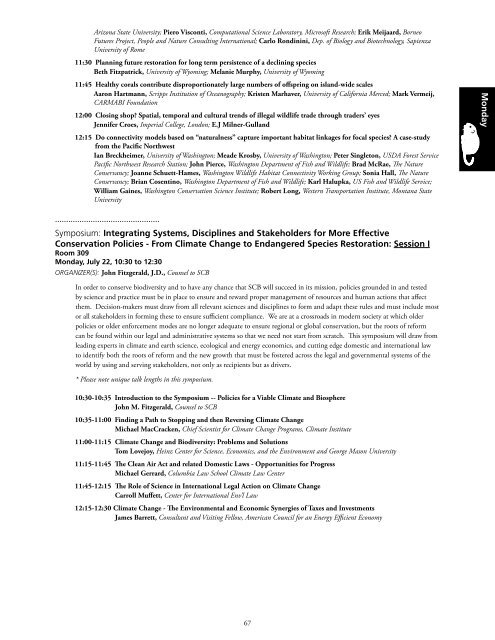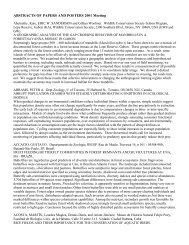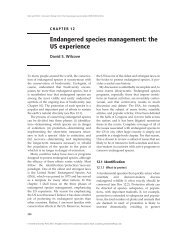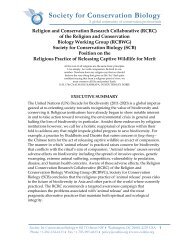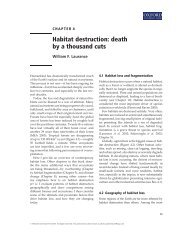ICCB 2013 Program - Society for Conservation Biology
ICCB 2013 Program - Society for Conservation Biology
ICCB 2013 Program - Society for Conservation Biology
Create successful ePaper yourself
Turn your PDF publications into a flip-book with our unique Google optimized e-Paper software.
Arizona State University; Piero Visconti, Computational Science Laboratory, Microsoft Research; Erik Meijaard, Borneo<br />
Futures Project, People and Nature Consulting International; Carlo Rondinini, Dep. of <strong>Biology</strong> and Biotechnology, Sapienza<br />
University of Rome<br />
11:30 Planning future restoration <strong>for</strong> long term persistence of a declining species<br />
Beth Fitzpatrick, University of Wyoming; Melanie Murphy, University of Wyoming<br />
11:45 Healthy corals contribute disproportionately large numbers of offspring on island-wide scales<br />
Aaron Hartmann, Scripps Institution of Oceanography; Kristen Marhaver, University of Cali<strong>for</strong>nia Merced; Mark Vermeij,<br />
CARMABI Foundation<br />
12:00 Closing shop Spatial, temporal and cultural trends of illegal wildlife trade through traders’ eyes<br />
Jennifer Croes, Imperial College, London; E.J Milner-Gulland<br />
Monday<br />
12:15 Do connectivity models based on “naturalness” capture important habitat linkages <strong>for</strong> focal species A case-study<br />
from the Pacific Northwest<br />
Ian Breckheimer, University of Washington; Meade Krosby, University of Washington; Peter Singleton, USDA Forest Service<br />
Pacific Northwest Research Station; John Pierce, Washington Department of Fish and Wildlife; Brad McRae, The Nature<br />
Conservancy; Joanne Schuett-Hames, Washington Wildlife Habitat Connectivity Working Group; Sonia Hall, The Nature<br />
Conservancy; Brian Cosentino, Washington Department of Fish and Wildlife; Karl Halupka, US Fish and Wildlife Service;<br />
William Gaines, Washington <strong>Conservation</strong> Science Institute; Robert Long, Western Transportation Institute, Montana State<br />
University<br />
...............................................<br />
Symposium: Integrating Systems, Disciplines and Stakeholders <strong>for</strong> More Effective<br />
<strong>Conservation</strong> Policies - From Climate Change to Endangered Species Restoration: Session I<br />
Room 309<br />
Monday, July 22, 10:30 to 12:30<br />
Organizer(s): John Fitzgerald, J.D., Counsel to SCB<br />
In order to conserve biodiversity and to have any chance that SCB will succeed in its mission, policies grounded in and tested<br />
by science and practice must be in place to ensure and reward proper management of resources and human actions that affect<br />
them. Decision-makers must draw from all relevant sciences and disciplines to <strong>for</strong>m and adapt these rules and must include most<br />
or all stakeholders in <strong>for</strong>ming these to ensure sufficient compliance. We are at a crossroads in modern society at which older<br />
policies or older en<strong>for</strong>cement modes are no longer adequate to ensure regional or global conservation, but the roots of re<strong>for</strong>m<br />
can be found within our legal and administrative systems so that we need not start from scratch. This symposium will draw from<br />
leading experts in climate and earth science, ecological and energy economics, and cutting edge domestic and international law<br />
to identify both the roots of re<strong>for</strong>m and the new growth that must be fostered across the legal and governmental systems of the<br />
world by using and serving stakeholders, not only as recipients but as drivers.<br />
* Please note unique talk lengths in this symposium.<br />
10:30-10:35 Introduction to the Symposium -- Policies <strong>for</strong> a Viable Climate and Biosphere<br />
John M. Fitzgerald, Counsel to SCB<br />
10:35-11:00 Finding a Path to Stopping and then Reversing Climate Change<br />
Michael MacCracken, Chief Scientist <strong>for</strong> Climate Change <strong>Program</strong>s, Climate Institute<br />
11:00-11:15 Climate Change and Biodiversity: Problems and Solutions<br />
Tom Lovejoy, Heinz Center <strong>for</strong> Science, Economics, and the Environment and George Mason University<br />
11:15-11:45 The Clean Air Act and related Domestic Laws - Opportunities <strong>for</strong> Progress<br />
Michael Gerrard, Columbia Law School Climate Law Center<br />
11:45-12:15 The Role of Science in International Legal Action on Climate Change<br />
Carroll Muffett, Center <strong>for</strong> International Env’l Law<br />
12:15-12:30 Climate Change - The Environmental and Economic Synergies of Taxes and Investments<br />
James Barrett, Consultant and Visiting Fellow, American Council <strong>for</strong> an Energy Efficient Economy<br />
67


